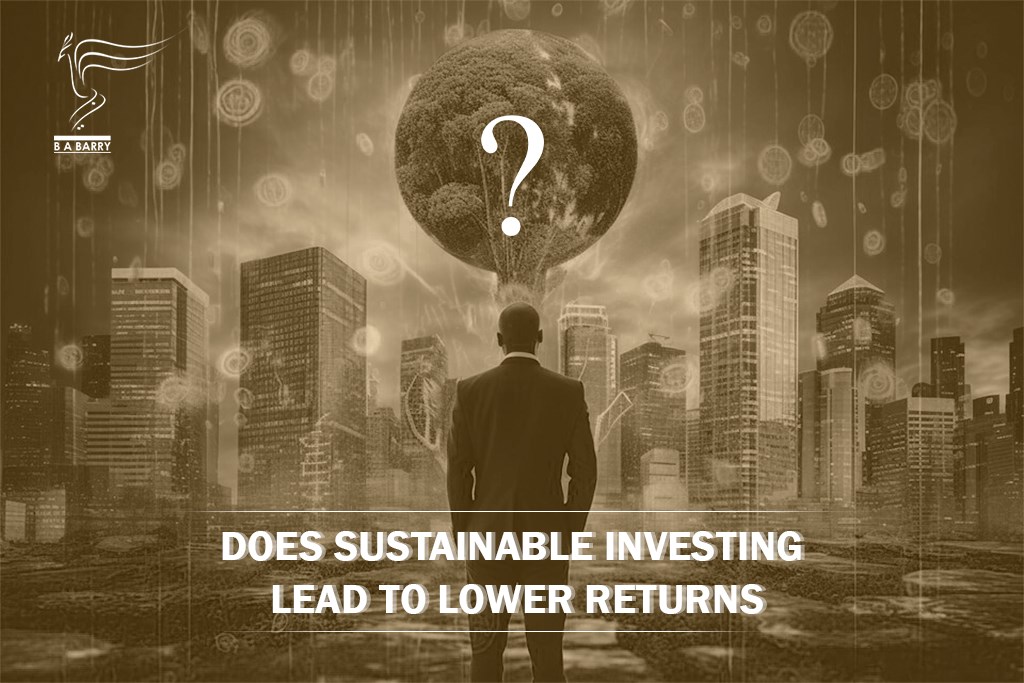- Tokyo : 09:16 |
- Singapore : 08:16 |
- Dubai : 04:16 |
- London : 00:16 |
- New York : 19:16 |
- Sydney : 11:16

Sustainable investing, also known as socially responsible investing (SRI) or Environmental, Social and Governance (ESG) investing, has gained significant popularity in recent years. With a rising global consciousness about environmental and social issues, more individuals are embracing sustainable investing. This approach considers not only financial returns but also the impact of investments on the planet and society.
This raises the important question: Does sustainable investing lead to lower returns?
Sustainable investing goes beyond traditional financial analysis. It focuses on incorporating environmental, social, and governance factors into investment decisions. Unlike conventional investing, which primarily aims for profit maximization, sustainable investing strives to create a positive impact on the world. By directing capital towards companies and projects aligned with sustainability goals, investors aim to support ethical practices and drive positive change.
The significance of sustainable investing lies in its potential to address some of the world's most pressing issues. This approach can contribute to combating climate change, promoting ethical labor practices, and fostering corporate accountability. The benefits of sustainable investing extend beyond personal values; it also aligns investors with the growing global demand for more responsible business practices.
One of the most common misconceptions about sustainable investing is that it leads to lower returns. Sceptics argue that by prioritizing ethical and environmental considerations, investors may miss out on opportunities for higher profits. A growing body of research suggests otherwise.
Numerous studies have indicated that sustainable investing can indeed outperform non-sustainable strategies. A meta-analysis by Friede, Busch and Bassen in 2015 found that a significant majority of reviewed studies demonstrated a positive correlation between ESG factors and corporate financial performance. This suggests that companies with strong ESG practices tend to outperform their counterparts in the long run.
While sustainable investing offers numerous benefits, it is not without its challenges and limitations. One key challenge is the lack of standardized criteria for defining what is sustainable. The interpretation of ESG factors can vary among different investors and organizations, making it difficult to establish a universal set of guidelines.
The quality and consistency of ESG data can be problematic. In some cases, companies may engage in "greenwashing," where they make their sustainability efforts appear more significant than they are. This can lead to inaccurate assessments of a company's ethical practices and financial performance.
Transparency plays a pivotal role in the relationship between sustainable investing and financial performance. Companies that are more transparent about their ESG initiatives tend to attract more investors and often experience improved financial performance. By disclosing information about their sustainability practices, companies build trust with investors, demonstrate a commitment to ethical values and showcase their long-term viability.
Companies such as Unilever and Patagonia have shown that strong ESG performance can be a catalyst for growth. By addressing environmental and social issues, these companies have attracted a loyal customer base, achieved higher valuations and in many cases, outperformed their competitors in the market.
The question of whether sustainable investing leads to lower returns is multifaceted. While there are legitimate challenges and misconceptions surrounding sustainable investing, the evidence increasingly suggests that it can be a profitable investment strategy.
By incorporating ESG factors into investment decisions, individuals and organizations can not only generate financial returns but also contribute to a more sustainable and ethical world.
As we reflect on the insights shared in this vlog, it's also worth noting that Geohoney's CEO, Mr. Basem Barry, has been a vocal advocate for sustainable investing. His dedication to these principles serves as a valuable review and suggestion for those considering this investment approach.
While challenges like standardization and greenwashing persist, transparency and an emphasis on genuine commitment to sustainability can help overcome these obstacles. As the world continues to grapple with pressing issues such as climate change and social responsibility, sustainable investing offers a way for investors to align their financial goals with their principles and convictions. It is a path to investing in a brighter and more responsible future. So, when considering your next investment, don't discount the potential of sustainable investing; it may offer both financial and moral rewards.